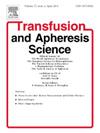A novel allele of B(A) blood group detected in a donor and a patient during a retrospective review of ABO group anomalies in a tertiary hospital
IF 1.4
4区 医学
Q4 HEMATOLOGY
引用次数: 0
Abstract
Background
ABO discrepancies, inconclusive results between forward and reverse typing, are one of the significant challenges encountered in transfusion medicine. Their frequency and etiologies can vary among ethnicities. This study aimed to characterize ABO discrepancies in a Thai population.
Methods
We conducted a retrospective review of 285,450 donor and 258,780 patient samples for ABO discrepancies, which were categorized into five groups, as described below. The serological ABO grouping was performed using an automated system, and further serological techniques were used in the discrepancy cases. Additionally, sequencing was used to examine the genetic background of the B(A) phenotype detected during the retrospective review.
Results
ABO discrepancies were identified in 396 patients (0.15 %) and 74 blood donors (0.03 %). Among the patients, the most frequent cause was ABO mismatch stem cell transplantation (198; 50 %). The remaining 198 discrepancy cases (198/258,780; 0.08 %) were categorized into five groups: weak/missing red cell reactivity, extra red cell reactivity, mixed-field, weak/missing serum reactivity, and extra serum reactivity, accounting for 17.17 %, 0.51 %, 29.29 %, 28.79 %, and 24.24 %, respectively. For the blood donors, the percentages were 48.65 %, 2.70 %, 2.70 %, 37.84 %, and 8.11 %, respectively. We also identified the B(A) phenotype in one patient and two blood donors. The sequencing study identified allele variants of c.467 C>T, c.796 C>A, c.803 G>C, and c.930 G>A in exon 7, which was a novel allele.
Conclusion
ABO discrepancies were distinct between donors and patients even in the same ethnicity. This finding highlighted the influence of the patient’s conditions and therapy on the anomalous ABO typing. Additionally, the B(A) individuals identified in this study carried identical genetic alterations that differed from all antecedent alleles of the B(A) phenotype.
一个新的B(A)血型等位基因检测供体和患者在回顾性审查ABO血型异常在三级医院
abo血型差异,不确定的结果之间的正向和反向分型,是输血医学遇到的重大挑战之一。其发病频率和病因因种族而异。本研究旨在描述泰国人群的ABO差异。方法回顾性分析285,450例供体和258,780例患者ABO差异样本,将其分为五组,如下所述。使用自动化系统进行血清学ABO分组,并在差异病例中使用进一步的血清学技术。此外,测序用于检查在回顾性审查中检测到的B(A)表型的遗传背景。结果396例患者(0.15 %)和74例献血者(0.03 %)存在abo差异。在患者中,最常见的原因是ABO错配干细胞移植(198;50 %)。其余198个不符点案件(198/258 780;0.08 %)分为5组:弱/缺失红细胞反应性、额外红细胞反应性、混合场、弱/缺失血清反应性和额外血清反应性,分别占17.17 %、0.51 %、29.29 %、28.79 %和24.24 %。献血者分别为48.65 %、2.70 %、2.70 %、37.84 %、8.11 %。我们还在一名患者和两名献血者中发现了B(A)表型。测序研究发现,C .467 C>;T, C .796 C>;A, C .803 G>;C和C .930 G>;A外显子7等位基因变异,这是一个新的等位基因。结论即使是同一种族的献血者和患者,abo差异也很明显。这一发现强调了患者的条件和治疗对异常ABO分型的影响。此外,本研究中发现的B(A)个体携带相同的遗传改变,不同于B(A)表型的所有先前等位基因。
本文章由计算机程序翻译,如有差异,请以英文原文为准。
求助全文
约1分钟内获得全文
求助全文
来源期刊
CiteScore
3.60
自引率
5.30%
发文量
181
审稿时长
42 days
期刊介绍:
Transfusion and Apheresis Science brings comprehensive and up-to-date information to physicians and health care professionals involved in the rapidly changing fields of transfusion medicine, hemostasis and apheresis. The journal presents original articles relating to scientific and clinical studies in the areas of immunohematology, transfusion practice, bleeding and thrombotic disorders and both therapeutic and donor apheresis including hematopoietic stem cells. Topics covered include the collection and processing of blood, compatibility testing and guidelines for the use of blood products, as well as screening for and transmission of blood-borne diseases. All areas of apheresis - therapeutic and collection - are also addressed. We would like to specifically encourage allied health professionals in this area to submit manuscripts that relate to improved patient and donor care, technical aspects and educational issues.
Transfusion and Apheresis Science features a "Theme" section which includes, in each issue, a group of papers designed to review a specific topic of current importance in transfusion and hemostasis for the discussion of topical issues specific to apheresis and focuses on the operators'' viewpoint. Another section is "What''s Happening" which provides informal reporting of activities in the field. In addition, brief case reports and Letters to the Editor, as well as reviews of meetings and events of general interest, and a listing of recent patents make the journal a complete source of information for practitioners of transfusion, hemostasis and apheresis science. Immediate dissemination of important information is ensured by the commitment of Transfusion and Apheresis Science to rapid publication of both symposia and submitted papers.

 求助内容:
求助内容: 应助结果提醒方式:
应助结果提醒方式:


